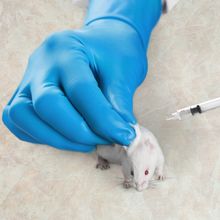Login
Subscribemice, neuroscience

The Heart Can Directly Influence Our Emotions
Natalia Mesa, PhD | Mar 1, 2023 | 4 min read
Researchers find that an increased heart rate can induce anxiety in mice, given the right context.

Our Favorite Neuroscience Stories of 2022
Dan Robitzski | Dec 28, 2022 | 4 min read
This year, neuroscience researchers made important discoveries related to how neurodegeneration attacks the human brain, hooked cultured neurons up to machinery to teach them to play a video game, and more.

Study Traces a Neural Circuit Behind Green Light–Mediated Pain Relief
Alejandra Manjarrez, PhD | Dec 9, 2022 | 4 min read
A mouse study concludes color-detecting cones in the eye and a subset of neurons in the brain’s thalamus are why green light exposure has an analgesic effect.

Cocaine Use Creates Feedback Loop with Gut Bacteria: Mouse Study
Alejandra Manjarrez, PhD | Nov 1, 2022 | 3 min read
A jolt of norepinephrine in the mouse gut facilitates colonization by certain microbes, which in turn deplete glycine, enhancing cocaine-induced behaviors.

Drug Spurs Neuron Growth in Mice with Chronic Spinal Cord Injury
Natalia Mesa, PhD | Sep 27, 2022 | 4 min read
A protein duo increases transcription of growth-related genes to enhance axon regeneration and boost plasticity, a study finds—but fails to improve mobility.

Mouse Brains Appear to Eavesdrop on Their Fat
Alejandra Manjarrez, PhD | Sep 9, 2022 | 4 min read
For the first time, a team visualizes sensory nerves projecting into adipose tissue in mice and finds these neuronal cells may counteract the local effects of the sympathetic nervous system.

Sex of Researcher Influences Ketamine’s Effects in Mice: Study
Shawna Williams | Sep 8, 2022 | 3 min read
The findings likely have implications for animal research far beyond the study of antidepressants.

Sun Exposure Triggers Hunger in Men but Not Women, Study Suggests
Shafaq Zia | Jul 12, 2022 | 4 min read
Ultraviolet radiation leads to secretion of an appetite-boosting hormone in male mice, but experts say it’s not yet clear whether the mechanism applies to humans.

Science Snapshot: How Brains Handle Surprise Parties
Lisa Winter | Jun 3, 2022 | 1 min read
When unexpected events occur, norepinephrine signals mouse brains to pay attention to key details.

Replacing Microglia Treats Neurodegenerative Disease in Mice
Shawna Williams | Mar 17, 2022 | 2 min read
Researchers find a way to wipe out the brain’s immune cell corps and send in new and improved versions.

Bacteria-Infecting Viruses in Gut Microbiome Linked to Cognition
Dan Robitzski | Feb 16, 2022 | 5 min read
Research in mice and flies suggests that bacteriophages, including those found in dairy foods, may have an influence on an animals’ ability to learn and remember information.

Tinkering with Gut Microbes Boosts Brain Plasticity in Mice
Sophie Fessl, PhD | Jan 13, 2022 | 4 min read
Intestinal bacteria contribute to the effect of stimulating environments on the brain’s ability to adapt, a study concludes.

Our Favorite Neuroscience Stories of 2021
Chloe Tenn | Dec 29, 2021 | 4 min read
From a Nobel prize and photosynthesis-powered brains to neurodegeneration research and controversy over a new Alzheimer’s drug, a look back at some of the biggest brain-related developments of the year.

Study Links Flu to Increased Parkinson’s Risk a Decade Later
Dan Robitzski | Nov 19, 2021 | 5 min read
Epidemiological research suggests that a flu diagnosis might be one factor in the eventual onset of the neurodegenerative disease, but experts say it doesn’t prove a causal relationship.

Neurons Firing Together Generate Spontaneous Pain
Abby Olena, PhD | Nov 10, 2021 | 4 min read
Abnormal sympathetic neuron growth leads to simultaneous activation of clusters of sensory neurons, causing the difficult-to-treat sensation.

Putative Exercise Hormone Irisin Boosts Mouse Brainpower
Sophie Fessl, PhD | Sep 10, 2021 | 4 min read
Mice lacking irisin didn’t exhibit the cognition improvements that typically follow exercise, and in mouse models of Alzheimer’s disease, treatment with the hormone reduced cognitive decline.

Tumors Disrupt the Blood-Brain Barrier at a Distance
Abby Olena, PhD | Sep 9, 2021 | 4 min read
Shoring up the tissues that separate neurons and other brain cells from the circulatory system in fruit flies and mice can prolong life in the presence of a tumor.

Early-Life Stress Exerts Long-Lasting Effects Via Epigenome
Asher Jones | Mar 18, 2021 | 5 min read
In mice, epigenetic marks made on histones during infancy influence depression-like behavior during adulthood. A drug that reverses the genomic tags appears to undo the damage.

A Tweak to Immune Cells Reverses Aging in Mice
Abby Olena, PhD | Jan 20, 2021 | 3 min read
Knocking out the receptor for a lipid that causes inflammation rejuvenates macrophage metabolism and restores cognitive function in an Alzheimer’s disease model.
